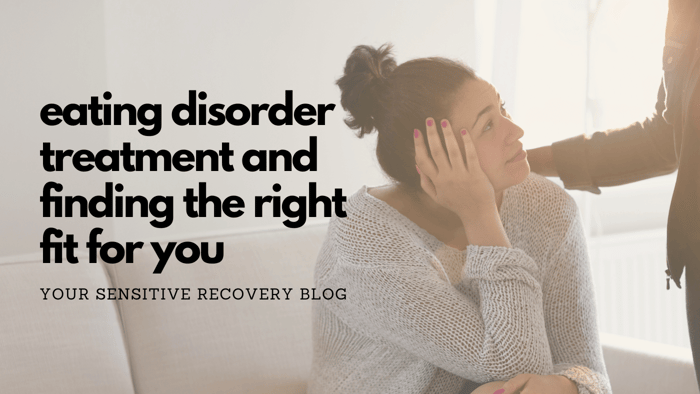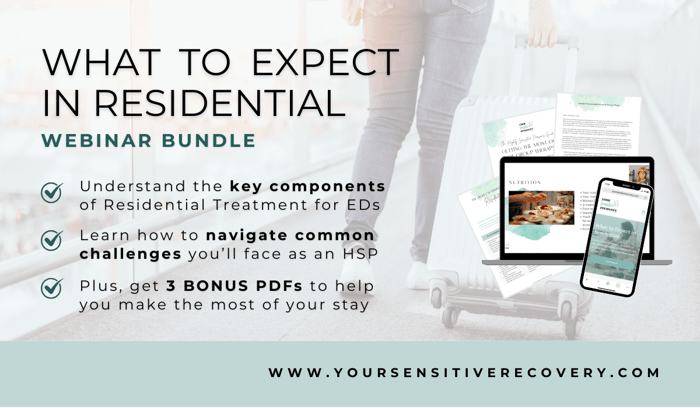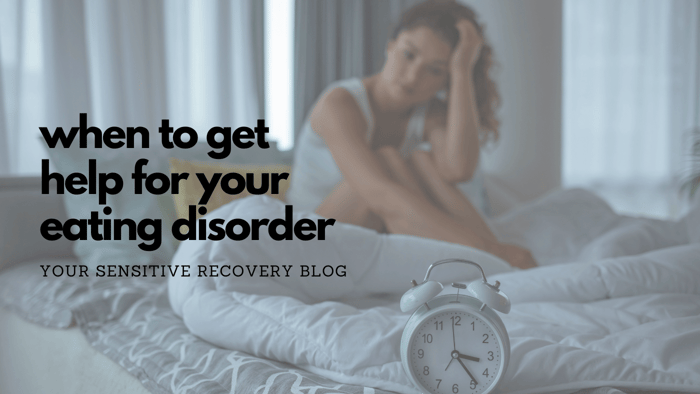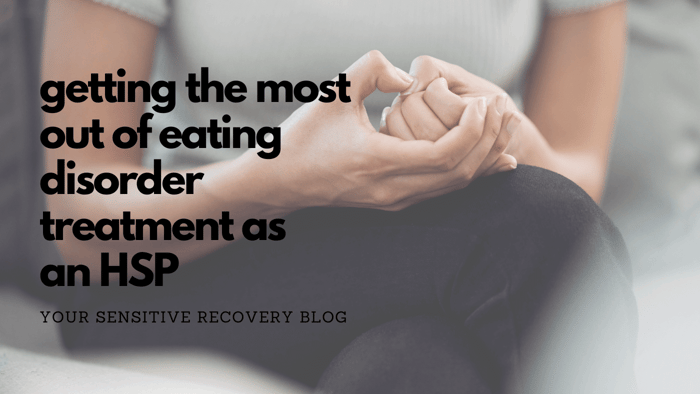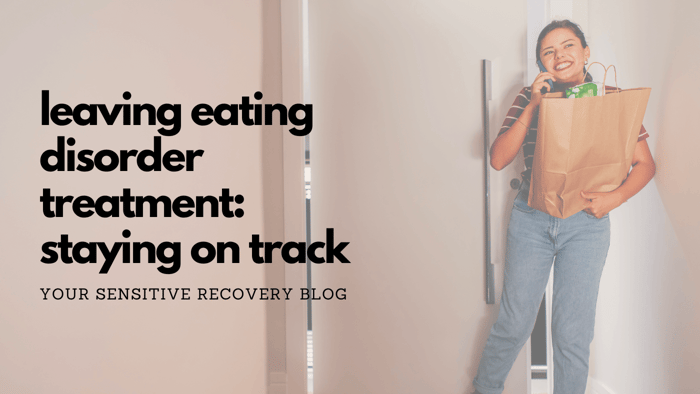Finding the right eating disorder treatment can feel like a huge, confusing task, especially when you're already anxious, emotionally raw, and unsure of what to expect or even what you need. If you’re a Highly Sensitive Person, you may be especially overwhelmed by the many options available. You might delay your decision due to uncertainty - a move that can have devastating repercussions.
In this post, I’ll walk you through the different levels of eating disorder care from lowest to highest, with brief overviews of what each one offers, and help you begin to understand which kind of care might be the best fit for you.
By the way, I'm using the phrase "level of care" throughout this post because that's the standard when discussing treatment, and that's the terminology you'll come across in your searches. It's a bit of a misnomer, however, because how much your provider cares is and should always be high. A more appropriate phrase would be "intensity of support" or "treatment environment."
Let's get started.
Outpatient Eating Disorder Treatment
Brief Overview: This is considered the lowest level of care because time-wise, it's a commitment of 1-3 hours/week. These appointments are all self-scheduled, and you'll typically be looking at 1-2 weekly therapy sessions and a weekly dietitian session if indicated. You can also schedule doctor and psychiatrist visits as needed.
Who is a good fit? Outpatient is a good place to start if your motivation to get better is moderate to high, you're able to resist some of your eating disorder urges, you have some healthy coping tools already, and you can ask for support and be honest and forthcoming with your providers about your eating disorder behaviors.
Can I do it online? Yes.
Does it require medical stability? Yes.
Do I need time off from work/school? No.
What amount of independence will I have? A high amount.
Intensive Outpatient Eating Disorder Treatment (IOP)
Brief Overview: IOP is considered a "step up" from outpatient. Generally (and this can vary widely depending on the program), it's a commitment of 5-15 hours a week. That might look like 2-3 hours/day, 2-5 days/ week. You can expect 2 weekly therapy sessions, a weekly dietitian session, a few hours of therapeutic groups, and 1-2 group meals + a snack each day you're at the program. Doctor and psychiatrist visits are usually with your outpatient providers, seen outside of program hours.
Who is a good fit? IOP may be right if outpatient therapy hasn’t provided enough support. Your motivation to get better is fair to high, but you need more accountability to resist eating disorder urges. You might also struggle to ask for help or to be fully honest about your behaviors.
Can I do it online? Yes.
Does it require medical stability? Yes.
Do I need time off from work/school? Maybe, depending on the schedule.
What amount of independence will I have? A moderate to high amount.
Partial Hospitalization Program (PHP)
Brief Overview: Don't let the name throw you. PHP programs were originally held on hospital grounds (hence the name), but many are now housed in separate facilities. This mid-level treatment is similar to going to work or school full-time: 5–8 hours/day, 5–7 days/week. It typically includes 2 weekly therapy sessions, a weekly dietitian session, a weekly psychiatry session, multiple therapeutic groups, and 2+ group meals and snacks daily. Nurse or doctor visits may occur weekly or as needed.
Who is a good fit? PHP can be helpful if you’re medically stable, but your motivation wavers and you’re struggling to interrupt eating disorder behaviors. It’s often recommended when co-occurring issues like depression or substance use are also present and need more intensive support.
Can I do it online? Not likely.
Does it require medical stability? Yes.
Do I need time off from work/school? Most likely.
What amount of independence will I have? A low to moderate amount.
Residential Eating Disorder Treatment (Res)
Brief Overview: Residential programs are 24/7 and often located in home-like environments. These programs are highly structured, with 2–3 weekly therapy sessions, 1-2 weekly dietitian sessions, a weekly psychiatry session, a weekly medical session (with daily vitals by nursing staff as indicated), 1–2 group outings per week, multiple therapeutic groups each day, and 3 meals + 2–3 snacks per day.
Who is a good fit? Residential care may be needed if you require consistent monitoring to stay safe. Motivation can range from low to high. Co-occurring mental health concerns may make this level more appropriate. A good amount of medical stability is usually required, though frequent monitoring ensures safety.
Can I do it online? No.
Does it require medical stability? To some degree, depending on the facility.
Do I need time off from work/school? Yes.
What amount of independence will I have? A low amount.
Inpatient Eating Disorder Treatment
Brief Overview: Inpatient care is also 24/7, but more medically focused and restrictive. The priority is stabilizing medical or psychiatric crises. Some programs offer brief therapy and groups for emotional support, but deeper therapeutic work typically happens later, at lower levels of care.
Who is a good fit? People experiencing acute medical issues (like low heart rate, electrolyte imbalances, or needing tube feeding) or psychiatric crises are likely to begin here. Stays are typically brief, with direct transfers to residential or PHP strongly encouraged and often arranged for you.
Can I do it online? No.
Does it require medical stability? No.
Do I need time off from work/school? Yes.
What amount of independence will I have? A very low amount.
Choosing Where to Start and Where to Go From There
Many professionals recommend starting at the least restrictive level of care and adjusting as needed. For some, that means beginning with outpatient. For others, a higher level might be more appropriate from the start. Personally, I encourage folks to trust their gut. You know yourself and your eating disorder better than anyone else. That said, if you plan to use insurance, their level-of-care guidelines will likely influence what treatment you receive and for how long.
It’s not uncommon to be “stepped up” to a higher level if your current treatment isn’t meeting your needs. This doesn’t mean you’ve failed. It simply means you're being given the support you need to heal.
Higher levels of care are designed to prepare you for the next step down. For example, someone in PHP 7 days/week may taper to 5 days before transitioning to IOP. It’s almost always best to move through eating disorder treatment levels gradually and without skipping levels, like going from residential to outpatient. Treatment can be hard, but doing it alone too soon can be even harder—and may increase the risk of relapse.
The Courage to Consider
There’s no shame in needing help for your eating disorder. These illnesses are cunning, confusing, and deeply painful. Most people need some form of professional care to fully recover.
If you're even reading this right now, it's a sign of your courage. Eating disorders have a way of convincing us that we are just fine...that others are worse off, so we don't really need help.
False. Eating disorders can not only damage your physical health, but they can wreck your mood, strain your relationships, and severely dim your hopes and dreams.
If you’re even considering eating disorder treatment, that alone is a sign that you need it...and you deserve it.
You don’t have to wait until things get worse. (Please don't.) You’re allowed to ask for help before you hit rock bottom. And with the right support, healing is absolutely possible.
I believe in you. 💪
✨ Josie Munroe, LMFT is a licensed therapist and owner of JosieMunroe.com and Your Sensitive Recovery. As a recovered clinician and Highly Sensitive Person, she loves supporting others on their journeys to form new, empowered relationships with food, their bodies, and their sensitivity. Join the newsletter for a weekly boost of hope and inspiration. You deserve a recovery that works for you! ✨

